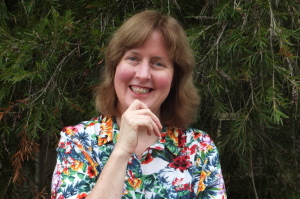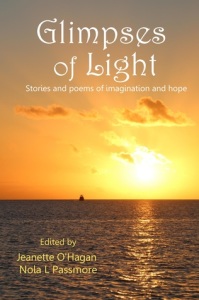 This is our final ‘Write Time’ guest blog. I don’t know about you, but I’m sorry to see the end of these insightful blogs. What I’ve found so great is the diverse angle each contributor’s brought to their post, and today is no exception as we welcome Nola Passmore to round out this series. Nola is a widely published poet and writer of short fiction and creative non-fiction, not to mention social psychologist and co-editor of the recently released ‘Glimpses of Light’ Anthology. She’s also in the throes of crafting an epic novel, which is bound to bear her stamp of excellence. But I’ll let Nola tell you more about that. Thanks, Nola. 🙂
This is our final ‘Write Time’ guest blog. I don’t know about you, but I’m sorry to see the end of these insightful blogs. What I’ve found so great is the diverse angle each contributor’s brought to their post, and today is no exception as we welcome Nola Passmore to round out this series. Nola is a widely published poet and writer of short fiction and creative non-fiction, not to mention social psychologist and co-editor of the recently released ‘Glimpses of Light’ Anthology. She’s also in the throes of crafting an epic novel, which is bound to bear her stamp of excellence. But I’ll let Nola tell you more about that. Thanks, Nola. 🙂
I have a problem. I’m writing a parallel narrative where a contemporary story about Libby interweaves with an historical one featuring Maggie. The two timelines intersect in that Maggie’s actions in the past affect Libby’s choices in the present. That’s complicated enough, but that’s not my main problem. I’ve set up the plot so that the historical story takes place in the early 1880s and then jumps forward thirty-five years to 1917. How do I account for thirty-five missing years without dumping lots of backstory?
I could fill in the details by continuing Maggie’s saga through those years. However, that would add way too much to my already-bulging manuscript. Another approach would be to narrow the gap by starting Maggie’s story later (maybe the 1890s) and finishing it sooner (well before 1917). However, the plot hangs around some key historical events. Changing my heroine’s timeline would mean altering significant parts of the narrative. Maggie wouldn’t be in Halifax to bring about certain social reforms, the subplot for one character would have to change completely, and the climax could no longer be tied to a real-life catastrophe. Even if I decided to make all of those changes, I wouldn’t be able to stop there because the historical part of the novel affects the present. If Maggie’s story changes, so does Libby’s. Everything is intertwined, with one person’s timeline inextricably linked to others.
Isn’t that the way it is in our lives too? If our ancestors had made different choices about where they worked and lived, we wouldn’t be the same people we are today. Some of us wouldn’t even have been born. Historical events also have an impact in the present. What if Hitler had won World War II? What if Jesus hadn’t died for my sins? What if Lucy Maud Montgomery had never stayed at her uncle’s house with the green gables? What if Lance Hills’ wife hadn’t needed a space-saving washing line?
At the beginning of each year, we have the opportunity to reflect on how we’ve used our time and to think about what we’d like to do differently in the months ahead. We can’t go back and change the timelines of our past and there will always be things we can’t control in the future. However, we can make choices about how we approach life now. In terms of writing, I’d like to focus more specifically on finishing my novel and solving my timeline dilemma. All suggestions welcome! I’d also like to achieve a better balance between work, family life and play. How about you? What are your hopes and dreams for 2016? Sometimes the road ahead can seem daunting, but if we take it one step at a time, we can achieve more than we ever thought possible. With God’s help, it’s going to be an awesome year.
 Nola Passmore has had more than 150 short pieces published, including devotionals, true stories, poetry, short fiction, magazine articles and academic papers. She loves exploring different facets of creativity and encouraging others to develop their God-given talents. She and her husband Tim have their own freelance writing and editing business called The Write Flourish. You can find her writing tips blog on their website.
Nola Passmore has had more than 150 short pieces published, including devotionals, true stories, poetry, short fiction, magazine articles and academic papers. She loves exploring different facets of creativity and encouraging others to develop their God-given talents. She and her husband Tim have their own freelance writing and editing business called The Write Flourish. You can find her writing tips blog on their website.
WOW! This is why i write non-fiction. I can see a trilogy coming up to fit in all those missing years!
I love how you’ve related it to our lives and the decisions our ancestors have made. But in the end, what you wrote is so true – it doesn’t really matter what and how they lived – we each have our own life to live now.
Thanks for your comment Jenny. Our novels sound as complicated as each other, but you’ve taken on even more with an entire series. It’s been such a huge task wrapping my head around this one. It did actually cross my mind that if I manage to get it published and people like it, they will expect another parallel narrative for Book 2. What was I thinking? LOL Sounds like we’ll be able to give each other feedback for many years to come.
Hi Nola,
The more I hear about the novel you’re working on, the more intriguing it sounds. I love parallel narratives and anything to do with time conundrums.
Thoughts such as those you’ve mentioned do our heads in, in a good way. I remember reading my Dad’s family history research about a great, great uncle who ventured to Australia, aged 19, to sus the place out, and later, others followed. As I read about the voyage, it occurred to me that because of this young adventurous man, I was born and live in Australia, yet he had no idea how many people yet to be born his actions were affecting.
Adele, I was caught by surprise to see you write that this is the last blog in the series. It doesn’t feel as if they’ve been going for long enough! Thanks for hosting it.
I agree, Paula. Time has crept away on us, but what a great series it has been. Many thanks for your contribution, too. The posts have been uniquely the author’s own, and have (I feel) brought really valuable insights to readers. And Nola, I’m also very keen to see this novel in print. Sounds fascinating.
Thanks Paula. Your great great uncle’s story sounds like the perfect backdrop to a Paula Vince novel. It’s amazing to think how the choices we make can have an effect in the future. Thanks for your comment. And Adele I was surprised too that it was the last one. I didn’t realise I was finishing the series. I really appreciated everyone’s takes on the topic.
This will be an interesting story when you finally iron out all those timeline issues, Nola. I love reading unique plots!
Thanks Rita. If I can pull it off, it should be good. Though many times I scratch my head and say ‘What was I thinking?’ Lots of plot problems to still work out. Thanks for your encouragement. Blessings.
I agree, Rita – and I know you seek unique angles in your own plots, which keeps your readers guessing. (And I see there are more novels in the pipeline. Great to see, Rita.) Nola’s novel should be one roller-coaster read when it’s done. Looking forward to it. 🙂
Thanks for inviting me to be part of this series, Adele. I’ve learned so much from each person and as you say, it’s amazing how each person has brought a different perspective to the mix. Thanks for the shout out too.
It’s been great having such quality contributors in the way of guest bloggers. The last series got me hooked, and I’ve not been disappointed this time around. Much appreciation to you for being a part of the Write Time blogs. I get so much out of them and hope others do, too.
Thanks Adele. It was a great idea to get different people’s thoughts. Looking forward to the next series 🙂
Wow, Nola. I’m impressed. Not sure I’d be courageous enough to write a dual narrative in two different time zones!
Yes, I often wonder ‘what if’ about various world events.
LOL Lynne – I don’t know if it was courage or ignorance. I’d read a few that I liked, particularly Kate Morton and Kimberley Freeman, and thought I’d give it a burl. I didn’t realise how complicated it was until I got into it. But I’m enjoying the ride and learning heaps. I think I’ll try to keep the second novel simpler … maybe! Thanks for your comment.
Hi Nola – I’m looking forward to the finished novel, with all those tricky timelines sorted out. I’ve had a few with my series as different events in one generation effect what happens in the next (and when children have to be born etc).
You do realise that you are setting the bar with your first novel and your fans may expect to do even better in novel number 2 😉